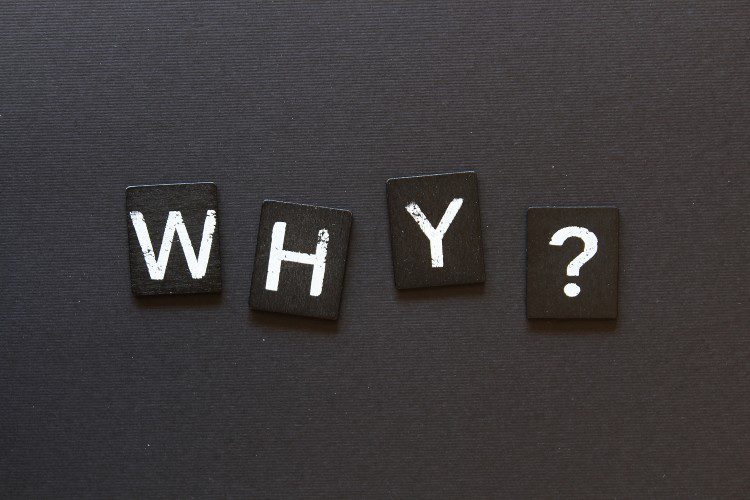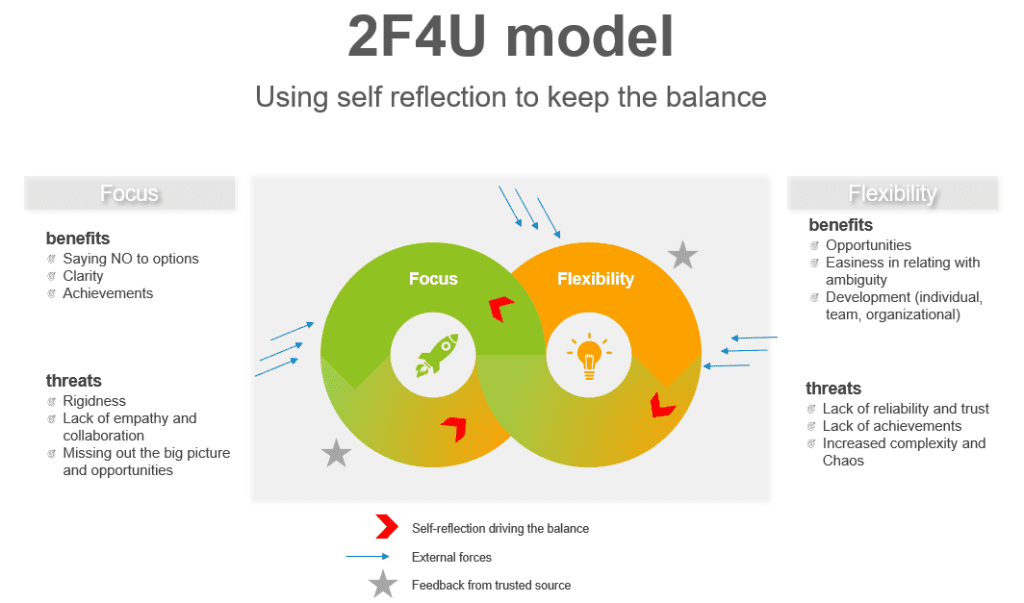An adaptive leadership model balancing focus and flexibility
Exploring our respective perspective of our own purpose.
Why You Should Care
Flow at work refers to a short-term peak experience that is characterized by absorption, work enjoyment, and intrinsic work motivation and is positively related to various indicators of job performance and leadership.
So what can we consciously do to improve our sense of flow and purpose to ultimately improve our wellbeing?
Exercising Focus and Flexibility provides a powerful opportunity for governing the parts of your wellbeing that remain within your scope of influence and power.
Living with purpose and establishing your “flow”
It is undeniable that one of the core indicators of wellbeing is our “flow” and sense of fulfillment in our sense of purpose.
When thinking about ‘living with purpose’, internal driving forces to find that sense of purpose, normally include our motivators, beliefs, and emotions. But getting to feel “the flow” with one’s purpose is left open to the impact of additional external positive and negative forces. Those circumstances that can make us feel like everything is setting us up to succeed, for example, impact our purposeful ‘flow’ positively. Equally, our flexibility to change and adapt, and our ability to focus are highly relevant for finding and maintaining this “flow”.
There is another side of the coin though, those factors that push us away from and block our “flow”. Those little internal voices that challenge our path, and if allowed to fester, destroy our journey and efforts to reach our destination: our purpose. There are also external factors that may turn as threatening as the internal ones and have similar strength to block us.
So what can we consciously do to improve our sense of flow and purpose to ultimately improve our wellbeing?

Everything we hear is an opinion, not a fact. Everything we see is a perspective, not the truth
Marcus Aurelius
Self-awareness takes the space from feedback
Increasing self-reflection capabilities became a demand in the current COVID-19 environment and will remain important in the future. In my coaching practice, I have noticed a few sparks of self-reflection but a rather high-dependency on feedback.
As an HR professional, I am concerned that strict people and leadership development processes may lead to excessive dependency on feedback. This dependence on feedback decreases the trust in our own judgment and makes us “puppet in someone else’s hands”. We risk getting caught in the game of managing perceptions, which, in my opinion, has exposed several ethical dilemmas.
This dependency is more damaging in the current situation when numerous people are working remotely. If we end up being dependent on feedback as a guiding principle of our personal and leadership development or change management, we may perceive a certain sense of isolation due to the current ‘social separation’ circumstance that naturally handicaps the ordinary paths for feedback interactions. Even if we have the courage to ask for feedback, what people can observe in the available online settings is subject to some limitations like the difficulty to frame the context for the feedback or our diverse personal circumstances. I certainly have had days when I just try to hold myself together during a call and not burst out. I have heard of many similar examples. How can we rely on feedback from such isolated events, when the context may not be understood?
Read more:
- The State of Talent-ism: Becoming an HR Anarchist in the Talent Management world
- Perks and Recreation: Creating ‘cool’ workplace belonging
- What Do Your People Need for Workplace Wellness?
We currently are living, to a big extent, in a shared context – one of high-complexity, ambiguity, isolation, and each of us copes with it at our best. I, for a time, thought that in our present context, collecting feedback may even be a damaging action, as the feedback giver simply cannot be aware of how the existing context is affecting the feedback receiver. Despite this intermittent wavering, I still stand by the thinking that there is a powerful path to replace, or at least equalize the addictive dependence in the form of confirmation from others, with a conscious activation of internal powers of self-reflection.
I am not intending to suggest or to ignore those external drivers, I merely aim to inject an awareness of all the complexities and offer simplicity.
Focus
It is during our darkest moments that we must focus to see the light
Aristotle
There are days that I just can’t look at the screen anymore. The amount of information, options, online meetings, and emails are overwhelming my senses. If I continue to follow the triggers and stimulants, I end up in a hamster wheel of burnout.
Steve Jobs said that focus is about saying no to things. I need to reduce the complexity and focus on what is important to me, focus on my wellbeing, my purpose, my objectives, my team, the closest people to me, and ultimately, prioritize. If I try and keep everything in focus, especially those triggers like feedback that has left me doubtful, I’ll stay in the wheel.
Read More:
- Burnout will be the next crisis, but HR can beat it
- Wellbeing & the speed of life
- Separation & Solitude in Extreme Psychological Waters
Focus provides clarity on grouping and prioritizing the driving forces and defining the approach to manage the contradictions; especially the restraining forces that come under the form of self-doubt.
In my case, such an increasing focus remains for certain limited periods of time. I struggle with the downsides that a too intense focus brings in the form of rigidity, lack of collaboration or lack of empathy. Through self-reflection, I push myself to open up again to variety and choice. Staying too long in an overly focused space creates an unhealthy environment for me. The force of self-reflection energizes movement towards flexibility.

Flexibility
Flexibility is one of the main roads leading to happiness
Mehmet Murat Ildan
A flexible approach increases the options and helps to focus the mind on opportunities rather than on blockages. Training a flexible mindset gets you into space where you adapt to circumstances, where everything is somehow possible. You start to perceive the changing environment, fixed objectives, or pre-set approaches as just another way of doing things. And, this may result in a backlash as too often, flexibility and adaptability can be perceived with caution by others and perhaps even deemed unreliable and untrustworthy. But this goes back to the feedback dependency issue – if we can ignore these external blockers, we can stay true to our intention and purpose.
The aim of a flexible approach is not to demand change as the purpose, but engage with at least the possibility of change.
The dance between focus and flexibility in leadership
When to be more focused or increase flexibility relies on a formulaic assessment. When we strengthen and rely on the self-reflection muscle, with practice we can easily detect where we are currently, in relation to any change that we desire.
Activated self-reflection will signal to us that we need to increase the focus and reduce the complexity of what’s in front of us. Or that we are blocked and are overthinking. Signals of this need to focus could vary from tiredness, anxiety, lack of energy, lack of sleep, mood swings, etc. By strengthening self-awareness, we can react on the first signal or even better, act proactively. But of course, we are not isolated from the world and others. We collect feedback from trusted and well-intentioned sources, without being dependent on it. We are curious about how people perceive what we do, or about what we intend to do. And we take their points of view as additional inputs.

Exercising 2F model prepared 4U provides a powerful opportunity of governance of the parts of your wellbeing that remain within your scope of leadership, influence, and power. I have practiced it during the lockdown, and it helped me on individual and leadership level in many occasions.
The balance between the 2Fs feels like a dance across the infinity line as you reflect on the drivers and as an outcome, you will feel a strong engagement with your purpose.
Sign up to the UNLEASH Newsletter
Get the Editor’s picks of the week delivered straight to your inbox!
Contact Us
"*" indicates required fields
Partner with UNLEASH
"*" indicates required fields
